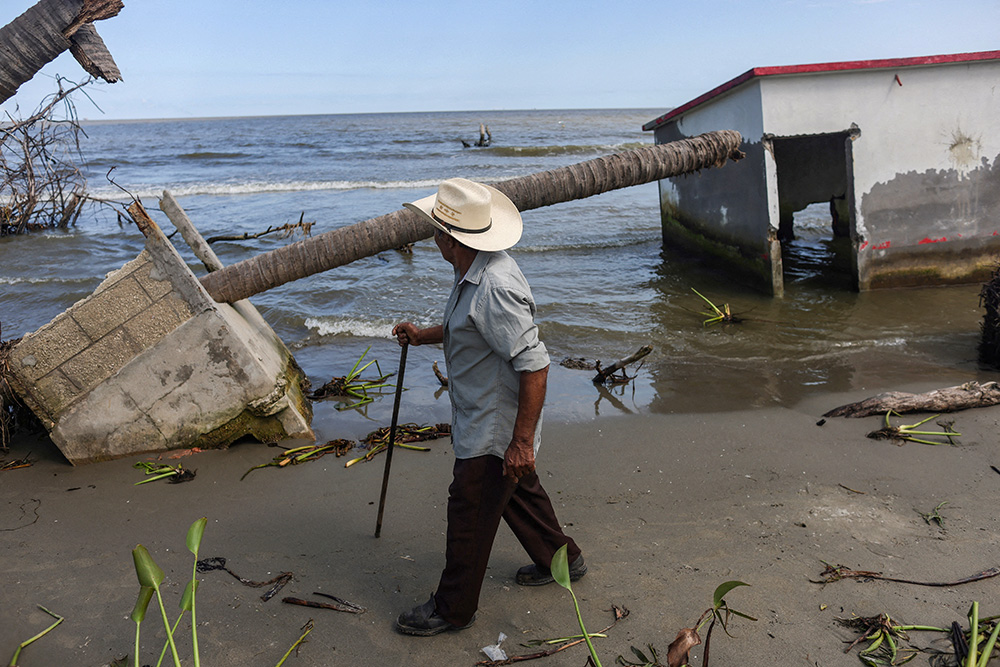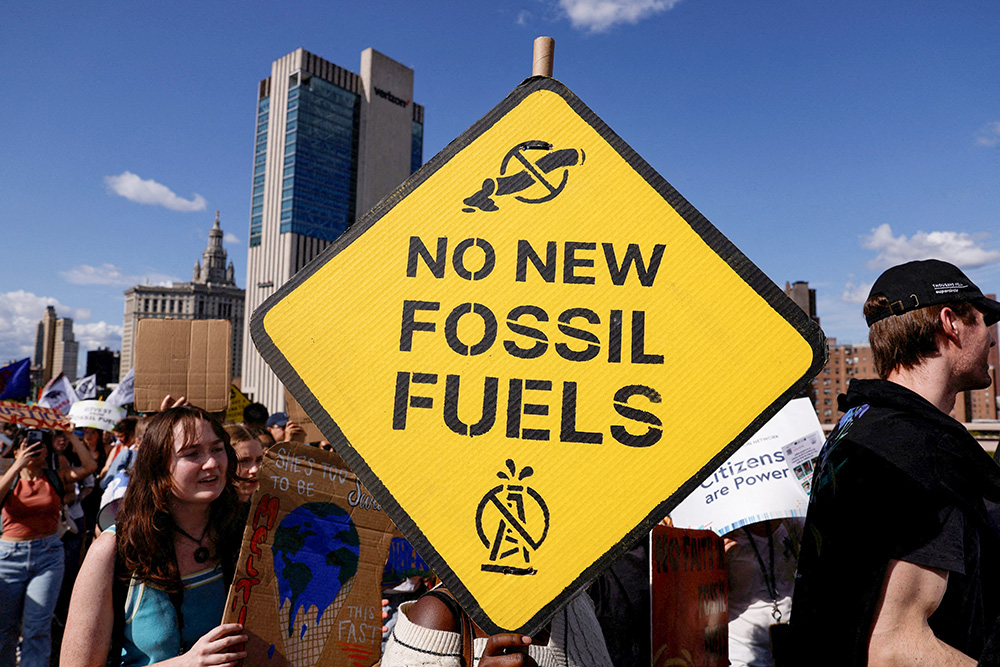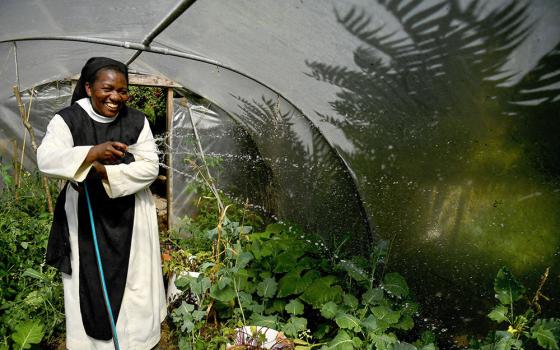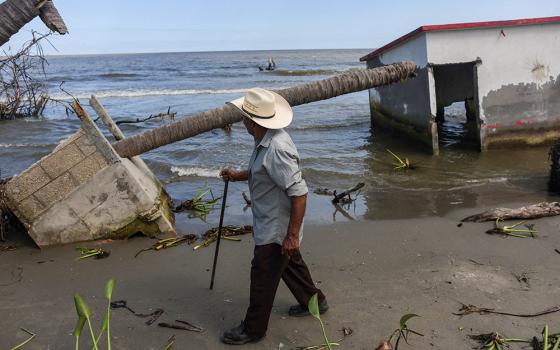
Antonio Mayoral, 76, walks past the place where his house once stood in El Bosque, Mexico, Nov. 7, 2022, amid rising sea levels that are destroying homes built on the shoreline and forcing villagers to relocate. (OSV News/Reuters/Gustavo Graf)
Ten years ago, Pope Francis' prophetic encyclical "Laudato Si', on Care for Our Common Home" framed the ecological crisis as a spiritual and moral emergency. With uncommon clarity, he declared that climate change was not only a scientific issue but "a global problem with grave implications: environmental, social, economic, political, and for the distribution of goods."
Its bold central thesis — that "the cry of the Earth" is inseparable from "the cry of the poor" — challenged a consumerist world to reimagine its priorities.
The next decade of Laudato Si', with the church now led by Pope Leo XIV, must shift from awareness to accountability. More Catholic dioceses and institutions must integrate environmental justice and integral ecology into pastoral life, school curricula and parish operations. Governments must swiftly transition away from fossil fuels and invest in clean energy. Artificial intelligence must be regulated to safeguard human dignity and labor rights.
Unfortunately, the U.S. Conference of Catholic Bishops has largely avoided meaningful public engagement with the encyclical. It was only at the bishops' 2024 assembly that Laudato Si' was formally discussed, after nearly nine years of institutional quiet, even though the U.S. remains among the world's top contributors to greenhouse gas emissions.
A 2024 survey by the Center for Applied Research in the Apostolate found that only one-third of U.S. Catholics knew about Laudato Si'. Forty-four percent said their dioceses had done "too little" to address climate change.
While some dioceses have taken significant steps, such as committing to reduce carbon emissions, divest from fossil fuels or power buildings with renewable energy, only 32 of the 195 U.S. dioceses have joined the Vatican's Laudato Si' Action Platform, a multiyear initiative launched in 2021 to guide the church in implementing Laudato Si'.
Advertisement
U.S. bishops have occasionally spoken out on climate issues, but the event remains rare. A study published in 2021 found that between 2014 and 2019, less than 1% of columns written by U.S. bishops mentioned climate change, global warming or their equivalent. At the bishops' 2024 fall meeting, Maronite Bishop Elias Zaidan was refreshingly honest: "We need to center the cry of the Earth and the cry of the poor. Not just with prayers, but with plans."
Laudable suggestions like year-round meatless Fridays or outdoor Masses are meaningful devotional practices. However, they fall short of the systemic transformation that the climate crisis demands.
When the Paris Climate Agreement was signed in 2015 — the same year Laudato Si' was released — the global community pledged to limit warming to 1.5 degrees C above pre-industrial levels. At the time, this seemed challenging but achievable.
But 2024 was the warmest year on record, with extreme wildfires devastating the Mediterranean, monsoon flooding displacing millions in Pakistan and entire low-lying nations contemplating full-scale evacuations.
The World Meteorological Organization confirmed that the global mean surface temperature surpassed 1.5 degrees C rise, marking the first calendar year to clearly exceed the Paris Agreement threshold.
The Vatican, for its part, has not remained idle. In 2023, Francis released Laudate Deum, a follow-up document that referred to the climate crisis as "one of the principal challenges facing society and the global community." It was widely seen as a blunt, desperate plea. "The world in which we live is collapsing and may be nearing the breaking point," Francis said. "Yet our responses remain inadequate."
Climate change is not a future threat but a current reality.
Still, greenhouse gas emissions continue to rise, trapping heat in the atmosphere, which contributes to a warming world. According to the International Monetary Fund, global fossil fuel subsidies reached an estimated $7 trillion in 2022.

Demonstrators march across the Brooklyn Bridge in New York City Sept. 20, 2024, to call for an end to the era of fossil fuels (OSV News/Reuters/Shannon Stapleton)
The moral dimension is devastating. An Oxfam study in 2023 found that the wealthiest 1% of people globally produce more carbon pollution than the poorest 66% combined. Women and children are at higher risk from climate-related disasters. In the United States, Black and Latino communities are significantly more likely to live in flood-prone zones, a University of Arizona study found.
Under President Donald Trump's first term, the U.S. withdrew from the Paris Accord and climate regulations. With Trump's return to office in 2024, concerns about renewed environmental deregulation are growing.
Without bolder systemic action — by both church and world leaders — Laudato Si' risks becoming an unrealized ideal rather than a living blueprint.
Elected just weeks before the Laudato Si' 10th anniversary, Leo XIV brings pastoral experience and intellectual rigor. From his first public remarks, Leo has connected the ecological crisis to another looming force: artificial intelligence.
"In our day, the church offers everyone the treasury of its social teaching in response to another industrial revolution and to developments in the field of artificial intelligence that pose new challenges for the defense of human dignity, justice and labor," he said.
This is not symbolic language. Leo has publicly called for international agreements to regulate autonomous weapons and establish global ethical standards governing AI development. Building on Francis' critique of the "technocratic paradigm," Leo warns of a new digital frontier where nature and labor are commodified in the name of efficiency.
In his homily June 7 for the vigil of Pentecost, Leo invoked Laudato Si' for its focus on connection and community, saying, "In a divided and troubled world, the Holy Spirit teaches us to walk together in unity. The earth will rest, justice will prevail, the poor will rejoice and peace will return, once we no longer act as predators but as pilgrims. No longer each of us for ourselves, but walking alongside one another. Not greedily exploiting this world, but cultivating it and protecting it, as the encyclical Laudato Si' has taught us."
Laudato Si' has inspired movement — just not enough. The next decade must be different.




